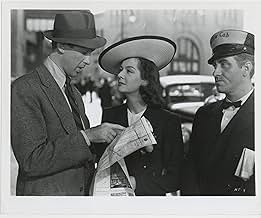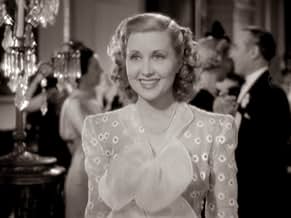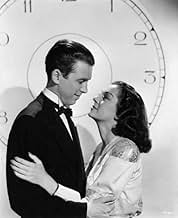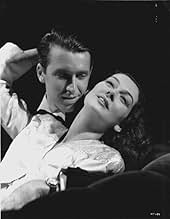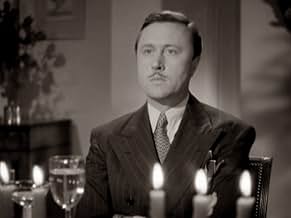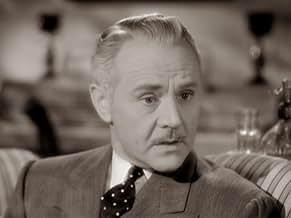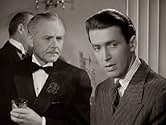Playwright Gaylord Esterbrook scores a hit with his first Broadway play, both with the critics and with leading lady Linda Paige. He and Linda are happily married until a patroness of the ar... Read allPlaywright Gaylord Esterbrook scores a hit with his first Broadway play, both with the critics and with leading lady Linda Paige. He and Linda are happily married until a patroness of the arts convinces Esterbrook to forget about comedy and concentrate on writing a tragedy. The e... Read allPlaywright Gaylord Esterbrook scores a hit with his first Broadway play, both with the critics and with leading lady Linda Paige. He and Linda are happily married until a patroness of the arts convinces Esterbrook to forget about comedy and concentrate on writing a tragedy. The end result nearly destroys his career and his marriage.
- Director
- Writers
- Stars
- Awards
- 2 wins total
- Philo Swift
- (as Charlie Ruggles)
- Frank
- (as Lawrence Grosmith)
- Actor in Show
- (uncredited)
- First-Nighter
- (uncredited)
- Waiter at Wyler's Party
- (uncredited)
- Police Sergeant
- (uncredited)
- Actor in Show
- (uncredited)
- Young Actress in Show
- (uncredited)
- Little Girl
- (uncredited)
- Director
- Writers
- All cast & crew
- Production, box office & more at IMDbPro
Featured reviews
Comedic drama adapted from a stage play. It's actually pretty funny with many good lines but it just lacks that spark to make it great. It certainly isn't the actors' fault---Russell is beautiful, funny and completely at ease--Stewart comes across as an immature, alcoholic jerk (but that's what he is playing)--Tobin is quite amusing and Charlie Ruggles makes to most of his small role of Amanda's husband. And it's always great to see Louise Beavers even if is in the demeaning black servant role. So--it is good but not great. It just misses the mark. But it always great to see Russell and Stewart so young and full of life. I give it an 8.
What is interesting here is the cultural mirror of the times. The amusing portrait of a cynical Manhattan is still recognizable, and the thesis that in bad times there is nothing more important than making people laugh is the same one Preston Sturges explored in his overrated SULLIVAN'S TRAVELS a year or so later. Though this film doesn't mix comedy and message drama as well as Sturges did, however imperfectly, the penultimate scene here is intriguing. Russell is prepared to marry the droll plutocrat whose wife has stolen Stewart from her, but he lets loose with a string of invective that probably accurately reflected the 'America First' Republicanism of the time. Russell decides that she'd rather be with a man who hates the fact that the free world was being taken over by fascists than by a man who sees all dictators with cynical detachment.
This film is heavy and crude where it should be light, and the implied sexual sophistication of the plot is not directed or played with the right tone at all. But this misfire will still manage to be of interest to some.
The film begins with a playwright (Stewart) being called to Broadway to do some re-writes for the play. They are in rehearsals and the play just doesn't quite flow the way they'd hoped. Stewart is not at all like they expected. After all, the play is a smart drawing room comedy featuring the upper crust--and Stewart is some Midwestern yokel who has never even been to the big city or been with the smart set. After some teething problems, however, the play is a success. This part of the film is very charming and seeing him and Rosalind Russell together was a treat.
The next portion of the film really stopped making sense. Now that Stewart and Russell are married, suddenly the sweet guy has turned into a major butt-head--a very selfish one at that. Now he drinks heavily and begins hanging out with the world's most superficial and annoying married woman anyone could imagine (Genevieve Tobin). While I hated the change in Stewart's character (since it seemed so out of character), everything about Tobin was wrong...100% wrong. Her character made no sense at all and was played so broadly you'd wonder how any semi-sane person could fall for this super-annoying....'lady'. Also incongruous is her husband (Charlie Ruggles)--he simply made no sense at all as the annoyed but unbelievably passive rich husband. At this point, the only person who comes off halfway convincing is Russell...but even she occasionally behaves oddly. It was really as if the film had two different writers who didn't even read each other's scripts before combining them.
The overall film really looks like two separate films. The first half I'd score an 8 and the second I'd score a 3. It really would have been improved with a revision...a re-write like Stewart's character was called in to do when the movie began. Not a good film, though it looks nice and has some lovely scenes. The bad just outweighs the good.
By the way, after Stewart behaved abominably through much of the film, why would Russell's character STILL want him?! What sort of screwy message is this projecting at women?!
One grace note: Charles Ruggles and Genevieve Tobin, who were paired so well in "One Hour with You" nearly a decade earlier, are coincidentally back in similar parts. He's as dry a light comedian as you could ask; she makes much out of little. But the movie keeps yelling how charming it's being, and trying to pass off boilerplate dialogue as repartee. 'Tain't funny, and it's not convincing as drama, either.
Did you know
- TriviaWhen Linda blows out Carrell's match in the bar, she's reacting to the old "three on a match" superstition.
- GoofsA montage dramatizing Gaylord's writers block includes three day & date calendar pages. The first two calendar pages are consistent with the year 1938, but the closest years for which the third page would be correct are 1930 or 1941.
- Quotes
Gaylord 'Gay' Esterbrook: [speaking to his wife Linda] Well, now, just what's behind that dark innuendo?
Clementine, Actress in Show: Aint nothing behind me, boss.
- ConnectionsFeatured in MsMojo: Top 10 Funniest Bloopers from Classic Hollywood Movies (2023)
- SoundtracksThe Wedding March
(1843) (uncredited)
from "A Midsummer Night's Dream"
Music by Felix Mendelssohn
Played after the wedding
- How long is No Time for Comedy?Powered by Alexa
Details
- Runtime
- 1h 33m(93 min)
- Color
- Aspect ratio
- 1.37 : 1


